Omicron: Staffing issues placing Welsh NHS under 'major strain'
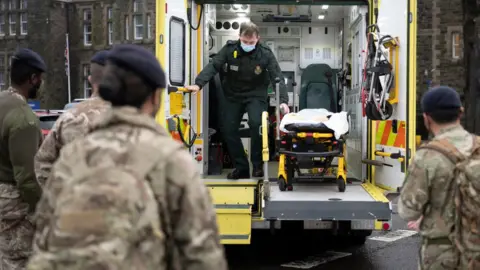 Getty Images
Getty ImagesUp to 15% of NHS staff at some health boards are off work as record Omicron cases cause disruption to services across Wales.
On average Wales has seen 8,948 Covid cases a day in the last week, almost double that of the week before.
NHS Wales boss Judith Paget said "every department" of the health service was under strain.
The Welsh Ambulance service said with hundreds of staff absent it had called on the military to boost numbers.
While hospitalisation levels remain lower than previous waves, one health board has said staff absences posed a "major workforce challenge".
The case rate in Wales has risen to 1986.5 cases per 100,000 in the last seven days of stable data, the highest since the start of the pandemic.
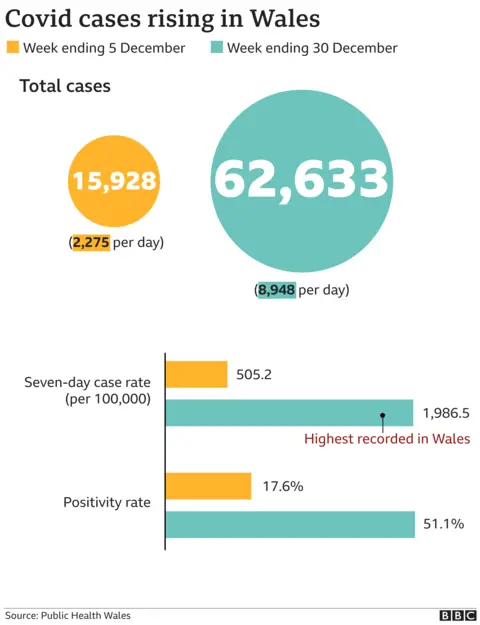
BBC Wales has taken a look at how the variant is impacting services, including the NHS, emergency services, councils and schools.
The NHS
Judith Paget, the Chief Executive of the Welsh NHS, said the availability of staff was the "main concern" for the health service currently.
"I think that staff absence will mean that health boards have to adjust and pause some of their services, they have done already, they will continue to do that," she said.
Ms Paget said staff absence levels ranged from 8.5% to 15% across Wales' health boards.
"Teams are working incredibly hard…staff are changing shifts, working on, changing their rotas, coming in from annual leave, doing what the NHS staff do amazingly well," she added.
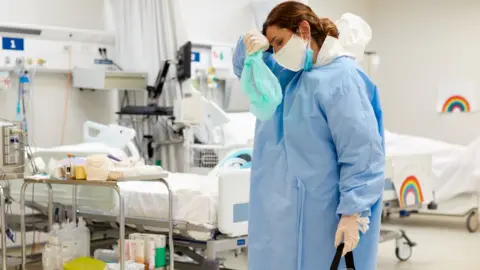 Getty Images
Getty ImagesAneurin Bevan Health have said that due to staff absences and "extraordinarily high demand" some elective procedures have had to be postponed.
Sue Green, of Betsi Cadwaladr University Health Board, said more than 600 staff were off work due to Covid, and staff had cancelled holidays to try to keep services going.
She added that in total around 10% of the workforce was currently unavailable for duty, and urged people to only go to A&E if it was "absolutely appropriate to do so".
Cardiff and Vale University Health Board said winter pressures coupled with the pandemic had put "significant strain" on its services, and rising cases pose a "major workforce challenge".
"Our staff are extremely fatigued from the exceptional levels of demand over a sustained period, but continue to go above and beyond every day to provide high-quality patient care," it said in a statement.
In a statement Cwm Taf Morgannwg University Health Board said the "significant pressure" of staff absences was causing a "major challenge" for its workforce.
Meanwhile, Morrison Hospital in Swansea has urged patients not to go to A&E, unless they have a life-threatening illness or serious injury.
Allow X content?

Emergency services
The Welsh Ambulance service said 346 frontline staff (10%) were absent due to Covid. When combined with non-Covid sickness this figure rises to 16%.
Lee Brooks, of the Welsh Ambulance Service, said 150 soldiers, sailors and aircrew will joining the 100 that had been assisting since October.
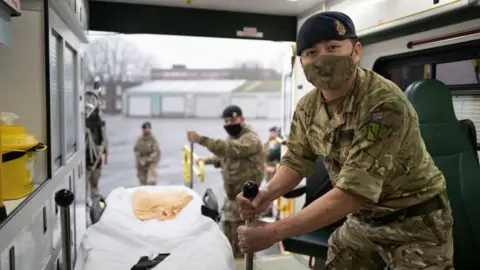 Getty Images
Getty ImagesNorth Wales Fire and Rescue said it had decided to scale back some of its prevention activities to "protect staff and our communities", as providing services has become "challenging" amid absences.
South Wales Police appealed to the public to "not to place further strain on our already stretched frontline services, by not playing their part to slow the spread".
The force said it had confidence in its contingency plans, which include the redeployment of officers, to "ensure we can respond to emergencies and continue protecting those who need us most".
Transport
Transport for Wales have implemented an emergency timetable because of staff absences, cutting up to 15% of its services.
 TfW
TfWInitial changes were made on 22 December, but from 3 January additional changes were made due to further absences.
Across the UK rail passengers are facing reduced services and cancellations, with Scotrail cancelling 8% of its services.
Coach operator Stagecoach said it "may not be able to run every service as planned" because of an "increasing numbers of employees impacted by the virus".
Schools
Laura Doel, director of teaching union NAHT Cymru, said staff absences were expected to cause "significant disruption" when most schools return on Thursday.
Wales' Deputy Chief Medical Officer, Dr Chris Jones, said the plan was to keep schools open at present.
However the first minister has warned staff illness meant some pupils would return to home learning, and schools should prepare for this.
 Getty Images
Getty ImagesMs Doel said she "would not rely" on schools having adequate supplies of lateral flow tests for staff.
"Schools staying open has to be our number one priority. We know the disruption we've had previously, nobody wants to return to online learning," she added.
Councils
Neath Port Talbot council said with the areas' Covid rates are the highest since the start of the pandemic, it expected to see disruption to its services over the coming weeks.
In a statement it said: "If this happens, we will be prioritising services for vulnerable people and essential services."
Sharon Carney, of Flintshire council, said the situation was "challenging", but at present the council have a degree of "resilience".
"But this is likely to change as the impacts of Covid and service pressures continue to influence workforce numbers," she added.
"The position is highly fluid and may deteriorate over the next few weeks when Covid infection levels are likely to peak."
Analysis by Steve Duffy, BBC News
We've been seeing record numbers of Covid cases in the community, but so far, numbers in hospital are nothing like we experienced last year.
In the latest figures there was a rolling average of 411 hospital patients with confirmed Covid in Wales on 31 December - a 44% rise on two weeks ago and the highest figure for more than a month.
But there were nearly four times as many people in hospital with confirmed Covid at the same point in 2020.
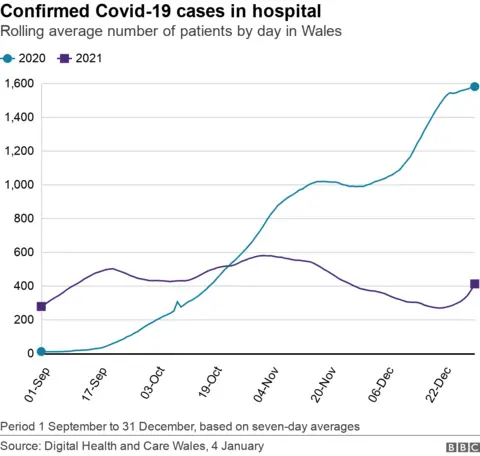
When we include patients with suspected Covid and recovering from Covid, there is an average of 594 patients. They make up 7.5% of all hospital patients.
However, this number also includes patients who are being treated for other conditions - and just happen to test positive when they are admitted.
Figures have not been published in Wales for these "incidental" Covid hospitalisations, but we know the proportion is around 30% of Covid patients in England.
The number of Covid patients on invasive ventilation or in critical care beds stood at 33 on 31 December.
At the same point in 2020, there were 119 critically ill Covid patients.
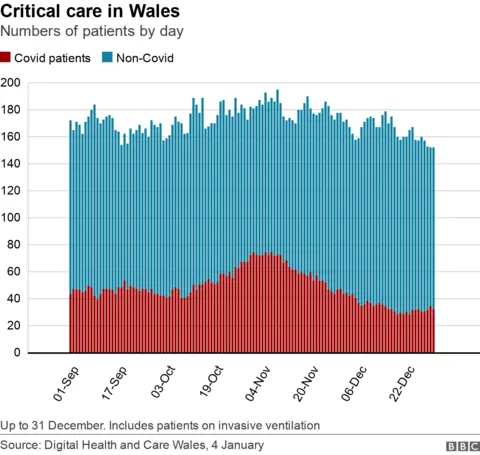
Another key indicator is deaths. Sadly, people are still dying from Covid but in far fewer numbers than we were seeing this time last year.
There have been 22 Covid deaths occurring in the last seven days, as reported by Public Health Wales, an average of around three a day.
This time last year, there were 51 Covid deaths a day occurring in Wales, registered with ONS, peaking at 83 deaths a day in the second week of January.
